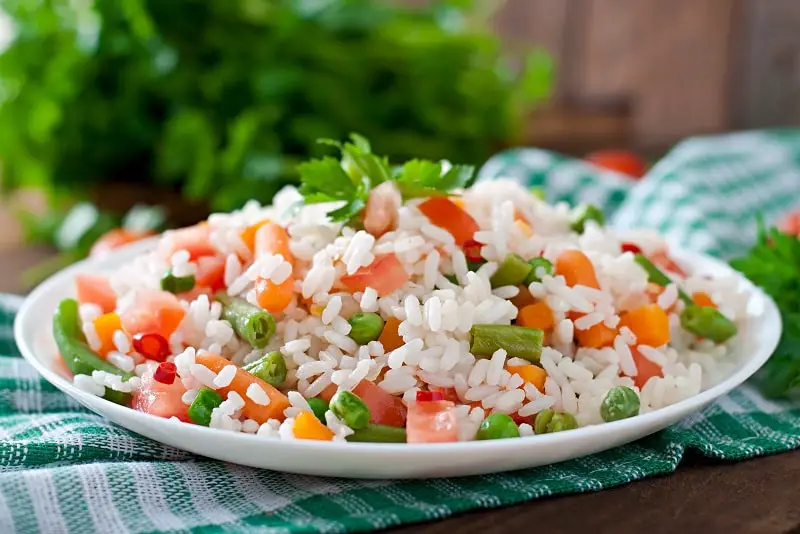This post contains affiliate links. When you buy through our links, we may earn a commission.
Are you frustrated because your rice always ended up sticky due to water imbalance? If yes, then there is nothing to worry about because we will provide the easy measurement that will help you to cook perfect basmati rice.
We know that with improper measurements, it’s possible sometimes your rice will be chalky, or it will become a paste because of too much water. Besides, every rice type has different water proportions, nutritional factors, and problems.

However, why not first understand the water ratio of basmati rice. To add more excitement, we will also talk about the benefits of basmati rice, which will help you lose weight.
So, without further ado, let’s jump in to know about the nutty-flavored basmati rice!
- How Much Water For Basmati Rice?
- What Is The Ratio Of Water To Rice?
- Does Basmati Rice Require More Water?
- How Much Water Do I Need For 75g Of Basmati Rice?
- How Much Water Do I Need For 150g Of Basmati Rice?
- How Much Water Do I Need For 250g Of Basmati Rice?
- How Much Water Do I Need For 2 Cups Of Basmati Rice?
- Is Basmati Rice Good For Weight Loss?
- Is Basmati Rice Healthier Than White Rice?
- Why Is Basmati Rice So Expensive?
- What’s The Best Way To Cook Basmati Rice?
- Conclusion
How Much Water For Basmati Rice?
When we talk about the best type of rice, then basmati rice is the most preferable in central Asia, the Indian subcontinent, and the Middle east. It is a long-grain white rice that has a nutty and unique aroma. Moreover, to get an airy and light texture of basmati, it’s essential to know how much water will be added.
You can use 1 ½ cup of water for 1 cup basmati rice. In case you have already washed or soaked the rice beforehand, you can use 1 cup of water for 1 cup of rice. However, if you are using parboiled basmati rice, you must add 2 cups of water to 1 cup of rice.
Now, you know the correct water measurement, so it’s possible to make thin and long grains that everybody will love. To get this distinct shape, it’s essential to soak the rice first and then use the same water for cooking aromatic basmati rice.
What Is The Ratio Of Water To Rice?
If you want to achieve the best rice quality, then it can be possible only when the rice is boiled after proper washing in cold water. Most importantly, it depends on the amount of water you will add to the pot. Besides, if you add less amount of water, then the rice will not be adequately cooked.
There is also a scenario where you will get a rice mixture when the amount of water is too much. Ultimately, the ratio of water to rice also depends on the type of rice you are cooking and also how much moist you want it.
So, the primary ratio is 2 cups of water in 1 cup of rice. You can also make it double or triple according to the recipe of different rice. Just make sure to use a large pot so that the rice will expand properly. The ratio for brown or arborio rice could be slightly different as it requires less or more time to cook.
Does Basmati Rice Require More Water?
You know that basmati rice is thin and long grains, and because of their nutty aroma, their meaning is “fragrant.” The incredible thing about basmati rice is its long grains, and they become four times longer when they are cooked.
Moreover, the basmati rice used in Indian-style rice recipes is drier, requiring less water. Besides, the amount of water also depends on the method by which you are cooking basmati rice.
For the stovetop method, you can add 2 cups of water in 1 ½ cup rice. You must add 1 ¾ cups of water in 11/2 basmati rice if you are cooking in the instant pot. Lastly, for the slow cooker method, you can use 1 ¾ cups of water in 1 ½ cup rice with cooking spray.
How Much Water Do I Need For 75g Of Basmati Rice?
While cooking basmati rice, there are two rules you must follow. First, measure the rice volume to make it easy for you to judge the amount of water. Then always ensure that you never stir the rice during cooking. They will break and turn sticky.
If you want to take 75 grams of basmati, then that will be 1 cup of rice per serving. So, in the first step, you can rinse basmati rice with cold water. After that, pour 150ml of water in a 75g serving with some salt in a pot. Lastly, swirl the rice a little to make sure they are well-distributed.
How Much Water Do I Need For 150g Of Basmati Rice?
You know the variety of rice just not vary from its region, but each batch is also different from the other. So, some batch of rice needs more water while some require less. If we take 150g of basmati rice, then what will be the required proportion of water.
You can add 180ml of water in 150g basmati rice to give a great texture. The long aromatic rice can tempt any rice eater to have them in their dinner regularly.
How Much Water Do I Need For 250g Of Basmati Rice?
You can make 250g of basmati rice by absorption method. In which you need to rinse the rice to remove the excess starch from them. Then you can add 500ml of water to a medium saucepan.
Make sure it will remain uncovered so the heat will be reduced to the lowest setting. After that, put the lid on and wait for 15 minutes. Lastly, allow it to cool down.
How Much Water Do I Need For 2 Cups Of Basmati Rice?
You know basmati rice has a fantastic starch composition, and because of that, it did not stick together while cooking compared to any other type of rice. Besides, for 2 cups of basmati rice, you will need to add 3 cups of water to the stovetop basmati rice recipe.
You can make 4-5 portions from it. The preparation time of 2 cups of basmati rice will be 10 minutes. However, the total cooking time will take 40 minutes.
Is Basmati Rice Good For Weight Loss?
It’s hard to leave rice when you grew up eating them. However, now you don’t have to do this because you can lose weight by including a rice diet in your plan. It’s actually an ultra-low-fat meal plan.
In fact, basmati rice can be a great addition to the diet for losing weight. You know that basmati is a whole grain form of rice and will be the perfect choice for any healthy eating plan. Moreover, it is lower in calories as compared to other rice.
It also has a lower level of the glycemic index, which is 52 that helps to get rid of belly fat, and you can maintain your healthy weight again. So, when you eat food with a low glycemic level, it will reduce your hunger pangs. Thus, it aids with weight loss.
Is Basmati Rice Healthier Than White Rice?
According to the nutritional facts of basmati rice, it has many carbs and micronutrients like selenium, folate, and thiamine. Moreover, if compared with white rice, then basmati rice has a low level of arsenic and enriched with several minerals and vitamins.
However, white rice is linked with many adverse effects on health. They have high in calories, and if you overeat white rice, then it can make you fat. So, we can say that basmati rice is healthier as they are also gluten-free.
Why Is Basmati Rice So Expensive?
Everyone knows that India majorly exports basmati rice. Due to the liberalization policy of the Indian government, fragrant rice has found its way in each country of the world. Moreover, every major store has an Indian brand of rice.
They are expensive because of their unique structure as the grains are so long and slender compared to regular rice. It actually comes in the size of 8.4mm. Then the second reason will be its aging. Also, the basmati rice is aged from 18 to 24 months.
The process is time-consuming and required certain conditions. Besides, the batches are placed in warehouses that also overhead the cost of rice. That’s why you will never get new basmati rice in the market ever.
What’s The Best Way To Cook Basmati Rice?
The best way to cook basmati rice is following the basic steps, which are:
- Washing
- Soak the Rice
- Water proportion
- Cook to boil
Washing
You should rinse the rice well because it will help to keep them from clumping while cooking. Make sure to drain the water 4 times through rice. So, the water of rice will be clear to look at.
Soak The Rice
It’s essential to soak the rice for 30 minutes so the grains will expand. This process lets the rice absorb moisture properly.
Water Proportion
Always remember to add 1 ½ cup of water for cooking each cup of basmati rice.
Cook
Initially, cook the rice on low flame because if you increase the heat too much, it will remain uncooked in the center. So, make the rice at the normal flame and wait for 10 minutes. When it’s ready, then check the texture before turning the heat off.
Conclusion
Now, you have a clear idea of how much water you need to add to basmati rice. Every increase in the volume of rice will also require more addition of water. This article holds information about specific rice measurements, which will help you judge how much water you need to add.
Besides, including a rice diet in your regular meal will indeed prevent you from heart disease, diabetes, and high blood pressure problems. You know that basmati rice is full of vitamins and minerals because of its nutritional benefits.
So, why not develop a healthy lifestyle by taking a portion of basmati rice on your plate!
